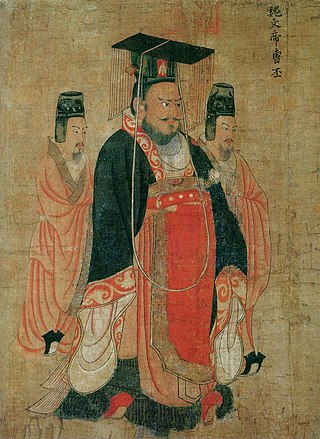Liu Rui may refer to:
Liu Rui may refer to:

The Jin dynasty or Jin Empire, sometimes distinguished as the Sima Jin or the Two Jins, was an imperial dynasty in China that existed from 266 to 420. It was founded by Sima Yan, eldest son of Sima Zhao, who had previously been declared the King of Jin. There are two main divisions in the history of the dynasty. The Western Jin (266–316) was established as the successor to Cao Wei after Sima Yan usurped the throne from Cao Huan and took the title of Emperor Wu. The capital of the Western Jin was initially in Luoyang, though it later moved to Chang'an. In 280, after conquering Eastern Wu, the Western Jin ended the Three Kingdoms period and reunited China proper for the first time since the end of the Han dynasty.

Cao Pi, courtesy name Zihuan, was the first emperor of the state of Cao Wei in the Three Kingdoms period of China. He was the second son of Cao Cao, a warlord who lived in the late Eastern Han dynasty, but the eldest son among all the children born to Cao Cao by his concubine, Lady Bian. According to some historical records, he was often in the presence of court officials in order to gain their support. He was mostly in charge of defence at the start of his career. After the defeat of Cao Cao's rival Yuan Shao at the Battle of Guandu, he took Yuan Xi's widow, Lady Zhen, as a concubine, but in 221 Lady Zhen died and Guo Nüwang became empress.

Emperor Yuan of Jin, personal name Sima Rui (司馬睿), courtesy name Jingwen (景文), was an emperor of the Jin dynasty and the first emperor of the Eastern Jin. During the Upheaval of the Five Barbarians, he was stationed in Jiankang south of the Yangtze River where he avoided the chaos that befell northern China. Primarily through the help of the cousins, Wang Dun and Wang Dao, he emerged as an authority figure within the empire with the backing of the southern gentry clans and northern officials who fled to him for refuge. After Emperor Min of Jin was executed by the Han-Zhao dynasty in 318, he took the title of Emperor and made Jiankang his capital. Though at the time of his death he left the state under the heel of Wang Dun, the Eastern Jin dynasty as it became known lasted until its fall in 420, contending with the so-called Sixteen Kingdoms in the north and occasionally in the southwest.
Liu He, courtesy name Xuantai, was briefly the second emperor of the Xiongnu-led Chinese Han-Zhao dynasty. He reigned for seven days in 310.

Liu Cong (died 31 August 318), courtesy name Xuanming, nickname Zai, also known by his posthumous name as the Emperor Zhaowu of Han (Zhao), was an emperor of the Xiongnu-led Chinese Han-Zhao dynasty. During his reign, the Han-Zhao brought the fall of the Western Jin dynasty, leading to its re-establishment in the south as the Eastern Jin dynasty at Jiankang in 318. His forces conquered the ancient Chinese capitals of Luoyang and Chang'an. He also captured the Emperor Huai of Jin and the Emperor Min of Jin, who he both executed after forcing them to act as cupbearers.
Hai Rui Dismissed from Office (Chinese: 海瑞罢官; pinyin: Hǎi Ruì bà guān; Wade–Giles: Hai3 Jui4 Pa4-kuan1) is a theatre play, written by Wu Han (1909-1969), notable for its involvement in Chinese politics during the Cultural Revolution. The play itself focused on a loyal Ming Dynasty minister named Hai Rui, who was portrayed as a savior to passive peasants for whom he reversed unjust land confiscations. The play became a center of scholarly and political controversy because of its implications for debates within the communist party, including at the Lushan Conference, regarding the political role of peasants going forward in light of the failures during the Great Leap Forward.
Chen Qun, courtesy name Changwen, was a Chinese politician of the state of Cao Wei during the Three Kingdoms period of China. He initiated the Nine-rank system for civil service nomination in Wei. Following the death of the first Wei emperor Cao Pi, Chen Qun, along with Sima Yi and Cao Zhen, nominated Cao Pi's son, Cao Rui, to be the new emperor.
Liu Shao, courtesy name Kongcai, was an official of the state of Cao Wei during the Three Kingdoms period of China. He often provided advice to the emperor Cao Rui, and was praised by Cao Rui for his good advice, even though Cao Rui did not frequently actually act on the advice. He also wrote poems to try to discourage Cao Rui from military and palace-building projects. When Sun Quan, the emperor of Wei's rival state Eastern Wu, led an army to attack the Wei stronghold at Hefei in 234, Liu Shao suggested to Cao Rui to send his forces to cut off Sun Quan's supply route rather than engage Sun Quan directly – a strategy that forced Sun Quan to withdraw.
Su Rui is a Taiwanese singer. In 1968, Su Rui skipped class to participate in a singing competition and was selected, joining the Zero Chorus to sing Western pop songs, and began her singing career. Later, she joined the Action Choir, named Julie in English. In 1971, she graduated from high school and began to perform at the Qingquangang American Army Club (CCK) in Taichung with Yingying Huang and they became friends. In 1973, she became the first female singer in residence at the Taipei Hilton. She was recommended to perform at the Hilton Hotel in Hong Kong, singing in Hong Kong for 3 years. Before becoming a singer, Su Rui wanted to be a physical education teacher. At that time, she was good at track and field and basketball, so she hoped to be a teacher and teach students.

Three Kingdoms is a 2010 Chinese television series based on the events in the late Eastern Han dynasty and the Three Kingdoms period. The plot is adapted from the 14th century historical novel Romance of the Three Kingdoms and other stories about the Three Kingdoms period. Directed by Gao Xixi, the series had a budget of over 160 million RMB and took five years of pre-production work. Shooting of the series commenced in October 2008, and it was released in China in May 2010.
Liu Rui is a Chinese curler. He was the skip of the Chinese men's Olympic Curling Team at the 2014 Winter Olympics.
Liu Ye, courtesy name Ziyang, was an adviser to the warlord Cao Cao during the late Eastern Han dynasty of China. After the fall of the Eastern Han dynasty, he served as an official in the state of Cao Wei during the Three Kingdoms period, serving under Cao Pi and Cao Rui. He was a member of the House of Liu, the imperial clan of the Han dynasty, and a direct descendant of Emperor Guangwu, via Guangwu's seventh son Liu Yan. He had two sons: Liu Yu (劉寓) and Liu Tao (劉陶).
He Qia, courtesy name Yangshi, was a Chinese official of the state of Cao Wei during the Three Kingdoms period of China. He was known for his austere lifestyle.
The Star Awards for Favourite Female Character is an award presented annually at the Star Awards, a ceremony that was established in 1994. It is given to an actress who portrayed a drama series or variety show character that is deemed the most popular among the television audience.
The Star Awards for Favourite Onscreen Couple (Drama) was an award presented annually at the Star Awards, a ceremony that was established in 1994.

Bitter Sweet is a 2015 Taiwanese romantic comedy television series produced by Sanlih E-Television, starring Ma Zhi Qin, Johnny Kou, Sunny Tu, Esther Liu, Tracy Chou, Steven Sun, Esther Yang, Xiu Jie Kai, Michael Zhang, and Ahn Zhe as the main cast. Filming began on July 8, 2015, and wrapped up in October 30, 2015. First original broadcast began July 23, 2015, on SETTV channel, airing weekly from Monday till Friday at 8:00-9:00 pm.

China participated in the 2017 Asian Winter Games in Sapporo and Obihiro, Japan, from February 19 to 26. China competed in all five sports. The Chinese delegation consisted of 236 people.

Wu Rui, King Wen of Changsha, was an ancient Chinese general and rebel leader who helped Liu Bang establish the Han dynasty. A Baiyue magistrate of Po County under the Qin dynasty, he rose to become King of Hengshan during the collapse of Qin and was enfeoffed as King of Changsha during the early Han dynasty.

The Changsha Kingdom was a kingdom within the Han Empire of China, located in present-day Hunan and some surrounding areas. The kingdom was founded when Emperor Gaozu granted the territory to his follower Wu Rui in 203 or 202 BC, around the same time as the establishment of the Han dynasty. Wu Rui and his descendants held the kingdom for five generations until Wu Zhu died without an heir in 157 BC. In 155 BC, the kingdom was reestablished for a member of the imperial family. However, the creation of this second kingdom coincided with the Rebellion of the Seven States and the subsequent reforms under Emperor Jing, and Changsha under the imperial family saw its autonomy greatly diminished. The kingdom was dissolved during Wang Mang's usurpation, briefly restored after the founding of the Eastern Han, and finally abolished in AD 33 and converted to a commandery under the imperial government.
Fán (樊) is a Chinese family name. It was the name of a fief, located in present-day Jiyuan in Henan province. Granted by Zhong Shanfu by Zhou Xuang Wang. It is shared by around 2 million people, or 0.150% of the population, with the province with the largest population being Henan.